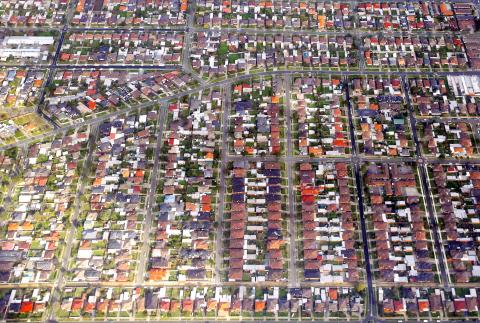Foreigners who break rules on buying Australian real estate are to face up to three years in jail or fines of A$127,500 (US$100,100) for individuals, and A$637,500 for companies, under tougher rules unveiled yesterday.
In announcing the changes, Australian Prime Minister Tony Abbott said his government was in favor of foreign investment.
“But it does have to be the right foreign investment, in the right things, and we do need to have a foreign investment review system which encourages public confidence that the foreign investment we need really is in Australia’s national interest,” Abbott said.

Photo: Reuters
Foreigners are only allowed to buy new dwellings and are barred from purchasing existing residential property in Australia, but the government says there has been little enforcement of the rules.
Wealthy foreigners, many from China, have been blamed for driving up prices in Australian property markets, particularly in Sydney and Melbourne, and placing home ownership out of the reach of many Australians.
Abbott said that under the changes enforcement would be beefed up, while third parties such as real-estate agents who knowingly assisted a foreigner to breach the rules would be fined up to A$42,500 for individuals and A$212,500 for companies.
The changes come after the government earlier this year announced it would introduce fees on all foreign investment applications, starting at A$5,000 for residential properties valued at A$1 million or less.
Australian Treasurer Joe Hockey said the government was already investigating about 100 cases of illegal purchases, and one divestment order had already been issued on a property that was now in the process of being sold to an Australian.
In March, Australia ordered China’s Evergrande Real Estate Group (恆大地產集團) to sell a Sydney mansion worth A$39 million that regulators said was bought illegally under foreign investment rules.
Hockey said foreign investors who have purchased illegally had a moratorium until Nov. 30 to come forward.
“They will be forced to sell their properties but they will not be subject to criminal prosecution by the Commonwealth government,” Hockey told a press conference with Abbott in Sydney.
“If you do not come to us we will come to you.”
Abbott said the changes were not designed to discourage foreign investment or to depress the property market, but to give people confidence that “locals are getting a fair go” in buying their own homes.
“If you play by the rules, there is no more welcoming place than Australia,” he added.
On Thursday, Australia’s Foreign Investment Review Board said in its annual report that China has for the first time overtaken the US as Australia’s largest source of foreign investment, spending A$27.7 billion in 2013-2014 as real-estate purchases more than doubled.
China’s spending in Australia for the year ending June 30 last year far outstripped the A$17.5 billion from the US — which was the biggest investor for more than a decade — and Canada’s A$15.4 billion, the report said. Rounding up the top five foreign investors were Malaysia at A$7.2 billion and Singapore at A$7.1 billion, it said.

KEEPING UP: The acquisition of a cleanroom in Taiwan would enable Micron to increase production in a market where demand continues to outpace supply, a Micron official said Micron Technology Inc has signed a letter of intent to buy a fabrication site in Taiwan from Powerchip Semiconductor Manufacturing Corp (力積電) for US$1.8 billion to expand its production of memory chips. Micron would take control of the P5 site in Miaoli County’s Tongluo Township (銅鑼) and plans to ramp up DRAM production in phases after the transaction closes in the second quarter, the company said in a statement on Saturday. The acquisition includes an existing 12 inch fab cleanroom of 27,871m2 and would further position Micron to address growing global demand for memory solutions, the company said. Micron expects the transaction to

Vincent Wei led fellow Singaporean farmers around an empty Malaysian plot, laying out plans for a greenhouse and rows of leafy vegetables. What he pitched was not just space for crops, but a lifeline for growers struggling to make ends meet in a city-state with high prices and little vacant land. The future agriculture hub is part of a joint special economic zone launched last year by the two neighbors, expected to cost US$123 million and produce 10,000 tonnes of fresh produce annually. It is attracting Singaporean farmers with promises of cheaper land, labor and energy just over the border.

US actor Matthew McConaughey has filed recordings of his image and voice with US patent authorities to protect them from unauthorized usage by artificial intelligence (AI) platforms, a representative said earlier this week. Several video clips and audio recordings were registered by the commercial arm of the Just Keep Livin’ Foundation, a non-profit created by the Oscar-winning actor and his wife, Camila, according to the US Patent and Trademark Office database. Many artists are increasingly concerned about the uncontrolled use of their image via generative AI since the rollout of ChatGPT and other AI-powered tools. Several US states have adopted

A proposed billionaires’ tax in California has ignited a political uproar in Silicon Valley, with tech titans threatening to leave the state while California Governor Gavin Newsom of the Democratic Party maneuvers to defeat a levy that he fears would lead to an exodus of wealth. A technology mecca, California has more billionaires than any other US state — a few hundred, by some estimates. About half its personal income tax revenue, a financial backbone in the nearly US$350 billion budget, comes from the top 1 percent of earners. A large healthcare union is attempting to place a proposal before